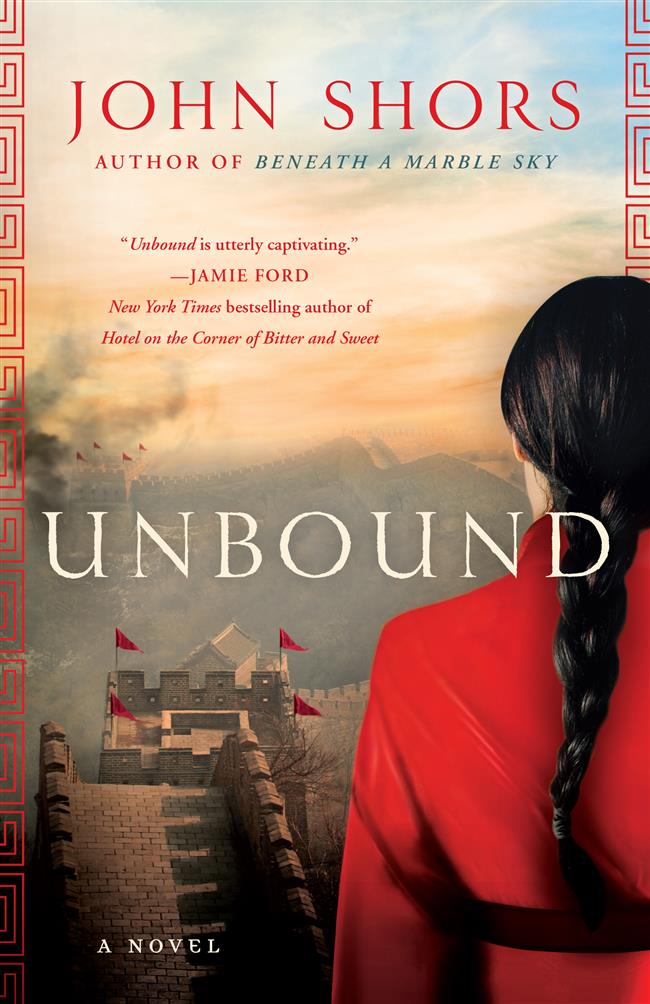Reliving the many tales of Great Wall

American novelist John Shors is obsessed with the Great Wall ─ and China.
Like a good writer who can carry his readers into the moment, a well-travelled writer is capable of describing the world to the readers in a way that they can relive the experience.
American novelist John Shors not only researched the Great Wall for a novel named “Unbound” set on one of the seven wonders of the world, but also studied the many legends and myths from China.
“I was delighted to discover the legend of Meng Jiangnu and her husband Fan ─ a Chinese couple who was caught up in the undercurrents as the Great Wall came up. I like her story and felt I could bring one back to life in my novel,” says Shors.
The legendary tale of the couple is set in 1548 when the Chinese empire faced an imminent Mongol invasion. All that prevented the violent end of a dynasty was the Great Wall. Yet even this famed fortification had weaknesses, and against his will, craftsman Fan was taken from home to help in building the wall.
Separated for a year, his wife Meng decided to do the impossible — leave everyone and everything behind to visit him at work. At a time when women feared to even step out of their homes, Meng disguised herself as a man and began the perilous journey of deliverance.
As the two armies clashed at the Great Wall, the fates of Fan and Meng collided with a Mongol horseman seeking redemption, a Chinese concubine fighting injustice and a ruthless general determined to destroy them all.
Loosely fashioned on the Chinese legend, Shors not only analyses the structure of the Great Wall and why it was built and repaired in the way it should be — or the way we see it today — but also explains the two ancient forces of yin and yang while creating his characters as they play the chess game of go.
His characters are reasonably imagined with detailed background explanations. They evolve naturally as more characters join the plot to make for an intense, historical page-turner.
“She had begun this journey to find Fan but now felt as she’d begun to find herself,” Shors writes in the book.
“I visited China in 2012 and spent most of my time on the Great Wall, walking many kilometers on it, stopping to take notes and photos. I tried to visit parts of the fortification that were away from the main tourist destinations so that I could be alone and contemplate what the Great Wall would have been like during the Ming Dynasty (1368-1644),” says Shors.
He returned to the United States to pen “Unbound.” He worked on the novel for several years and after finishing it, he flew back to China in 2016.
“Once again, I walked for long distances on the Great Wall, thinking about my story and making sure that I had captured the spirit of both the Great Wall and the wilderness that surrounds it. I wanted the Great Wall to become a character in my novel,” says Shors.
A graduate of Colorado College, Shors lived for several years in Kyoto, Japan, where he taught English. Since 1991, he has been traveling across Asia, visiting 10 countries, climbing the Himalayas and looking for a story to tell.
“Unbound” is his seventh novel. After establishing himself as a writer with tales from the Taj Mahal and Angkor Wat, and stories set in Japan, Nepal, Thailand and Vietnam, Shors set up the John Shors Travel in 2014 to provide readers and travelers an unparalleled experience — all settings from his novels.
“In the books, I have written about different parts of the world. I want to share the interesting bits with people everywhere,” he says.

“Unbound” is about the legend of Meng Jiangnu and her husband Fan.

John Shors' first novel "Beneath A Marble Sky"
Q: How do you decide the story you think best represents the country you have visited and written about?
A: In all my books, I have written about parts of the world that I find really interesting, and I want to share with people everywhere. For example, my first novel, “Beneath a Marble Sky,” is based on the remarkable love story behind the creation of the Taj Mahal. That novel is now published in 25 languages and is being made into a major mini-series by Hollywood.
One of my goals is that “Unbound” will also introduce a large number of people to not only the Great Wall, but also to a fascinating time in China. I think that books have the potential to be both highly educational and entertaining, and I've always written my novels with that thought in mind.
Q: In this case of writing the “Unbound,” do you think Ming Dynasty offers the basic image of what China or the Chinese was like?
A: I believe that the different dynasties in China tended to inspire cultural shifts in people of all classes. And while I think all of these dynasties were fascinating, I decided to set “Unbound” in the Ming Dynasty because it seemed to me that China was going through a lot of upheaval during this time.
During the Ming Dynasty, important scientific discoveries were made, vast infrastructure was built and an appreciation for the arts was increased. Even more important, women began to slowly and quietly gain more power.
Of course, practices like foot-binding were still common, but women began to assert themselves in subtle ways. For instance, women began to write poetry, which had long been an art completely dominated by men.
In the West, I think that people tend to think of ancient China through the lens of the Ming Dynasty, and I wanted to really understand this interesting period of China's history.
Q: What attracts you most on your trips to China?
A: What I like a lot about China is that it’s a wonderful blend of ancient and modern-day sights. For instance, when I was in Shanghai, I spent one morning at the Yuyuan Garden, walked along the Bund and then enjoyed the view of the city one of the observation towers.
For me, it’s fun to explore China’s ancient history, as well as modern-day achievements. Equally important, I appreciate Chinese culture, both past and present.
Q: Any big plans in the future?
A: I am presently working on a science-fiction trilogy set in various parts of the world. This is a huge project for me, and my hope is that the series will be published in early 2019.
I’m quite excited about this project, as I think that it’s really unique and compelling. I also try to connect with many readers as possible. I spent a lot of time responding to people who reach out to me via Facebook and Instagram.
And most importantly of all, my wife and I have two teenage children. We plan on taking them to China in about a year. I’m really excited to take them across China, and to show them the many magnificent sites that I know so well.
















